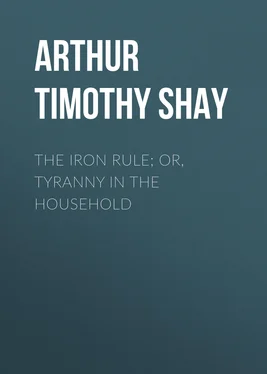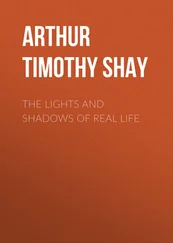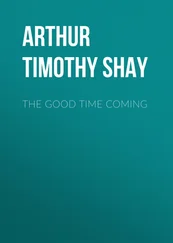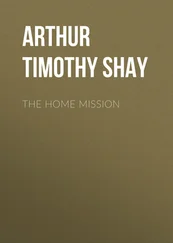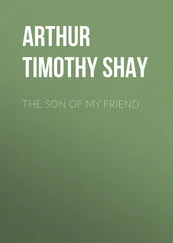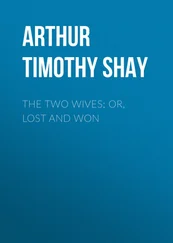Timothy Arthur - The Iron Rule; Or, Tyranny in the Household
Здесь есть возможность читать онлайн «Timothy Arthur - The Iron Rule; Or, Tyranny in the Household» — ознакомительный отрывок электронной книги совершенно бесплатно, а после прочтения отрывка купить полную версию. В некоторых случаях можно слушать аудио, скачать через торрент в формате fb2 и присутствует краткое содержание. Жанр: foreign_sf, literature_19, foreign_antique, foreign_prose, на английском языке. Описание произведения, (предисловие) а так же отзывы посетителей доступны на портале библиотеки ЛибКат.
- Название:The Iron Rule; Or, Tyranny in the Household
- Автор:
- Жанр:
- Год:неизвестен
- ISBN:нет данных
- Рейтинг книги:4 / 5. Голосов: 1
-
Избранное:Добавить в избранное
- Отзывы:
-
Ваша оценка:
- 80
- 1
- 2
- 3
- 4
- 5
The Iron Rule; Or, Tyranny in the Household: краткое содержание, описание и аннотация
Предлагаем к чтению аннотацию, описание, краткое содержание или предисловие (зависит от того, что написал сам автор книги «The Iron Rule; Or, Tyranny in the Household»). Если вы не нашли необходимую информацию о книге — напишите в комментариях, мы постараемся отыскать её.
The Iron Rule; Or, Tyranny in the Household — читать онлайн ознакомительный отрывок
Ниже представлен текст книги, разбитый по страницам. Система сохранения места последней прочитанной страницы, позволяет с удобством читать онлайн бесплатно книгу «The Iron Rule; Or, Tyranny in the Household», без необходимости каждый раз заново искать на чём Вы остановились. Поставьте закладку, и сможете в любой момент перейти на страницу, на которой закончили чтение.
Интервал:
Закладка:
T. S. Arthur
The Iron Rule; Or, Tyranny in the Household
CHAPTER I
ANDREW HOWLAND belonged to that class of rigid moralists who can tolerate in others no wanderings from the right way. His children were forced into the straight jacket of external consistency from their earliest infancy; and if they deviated from the right line in which they were required to walk, punishment was sure to follow.
A child loves his parent naturally. The latter may be harsh, and unreasonable; still the child will look up to him in weak dependence, while love mingles, like golden threads in a dark fabric, amid the fear and respect with which he regards him. Thus it was with the children of Andrew Howland. Their mother was a gentle, retiring woman, with a heart full of the best affections. When the sunshine fell upon her golden locks in the early days of innocence, it was in a home where the ringing laugh, the merry shout, and the wild exuberance of feeling ever bursting from the heart of childhood were rarely checked; or, if repressed, with a hand that wounded not in its firm contraction. She had grown up to womanhood amid all that was gentle, kind and loving. Transplanted, then, like a tender flower from a sunny border, to the cold and formal home of her husband, she drooped in the uncongenial soil, down into which her heart-fibres penetrated in search of nutrition. And yet, while drooping thus, she tenderly loved her husband, and earnestly sought to overcome in herself many true impulses of nature to which he gave the false name of weaknesses. It was less painful thus to repress them herself, than to have them crushed in the iron hand with which he was ever ready to grasp them.
Let it not be thought that Andrew Howland was an evil minded man. In the beginning we have intimated that this was not so. He purposed wrong to no one. Honest he was in all his dealings with the world; honest even to the division of a penny. The radical fault of his character was coldness and intolerance. Toward wrong-doing and wrong-doers, he had no forbearance whatever; and to him that strayed from the right path, whether child or man, he meted out, if in his power, the full measure of consequences. Unfortunately for those who came within the circle of his authority, his ideas of right and wrong were based on warped and narrow views, the result of a defective religious education. He, therefore, often called things wrong, from prejudice, that were not wrong in themselves; and sternly reacted upon others, and drove them away from him, when he might have led and guided them into the paths of virtue.
The first year of Andrew Howland's married life was one of deep trial to the loving young creature he had taken from her sunny home to cherish in his bosom—a bosom too cold to warm into vigorous life new shoots of affection. And yet he loved his wife; loved her wisely, as he thought, not weakly, nor blindly. He saw her faults, and, true to his character, laid his hands upon them. Alas! how much of good was crushed in the rigid pressure!
To Mr. Howland life was indeed a stern reality. Duties and responsibilities were ever in his thoughts. Pleasure was but another name for sin, and a weakness of character an evil not to be tolerated.
Enough, for our present purpose, can be seen of the character of Andrew Howland in this brief outline. As our story advances, it will appear in minuter shades, and more varied aspects. Seven years from the day of his marriage we will introduce him to the reader.
"What shall I do with this boy?" said Mr. Howland. He spoke sternly, yet in a perplexed voice, while he walked the floor of the room with a quickness of tread unusual. "If something is not done to break him into obedience he will be ruined."
"He needs all our forbearance," Mrs. Howland ventured to remark, "as well as our care and solicitude."
"Forbearance! I have no forbearance toward wrong, Esther. You have forborne until the child is beyond your control."
"Not entirely," was meekly answered, as the mother's eyes drooped to the floor.
At this moment a servant, who had been sent for the child, came in with him. A few doors away lived another child, about the same age, of whom little Andrew was very fond, and whose companionship he sought on every occasion. Against the father of this child Mr. Howland had imbibed a strong prejudice, which was permitted to extend itself to his family. Rigid and uncompromising in everything, he had observed that Andrew was frequently in company with the child of this neighbor, and felt impelled to lay a prohibition on their intercourse. But Andrew, a light-hearted, high-spirited boy, who inherited from his father a strong will, was by no means inclined to yield a ready obedience in this particular. He loved his little companion, and never was happier than when in her society. Naturally, therefore, he sought it on every occasion, and when the positive interdiction of their intercourse came, the child felt that a duty was imposed upon him that was impossible of fulfillment. Young as he was, he could endure punishment, but not give up his little friend. Advantage was therefore taken of every opportunity to be with her that offered. Punishments of various kinds were inflicted, but they acted only as temporary restraints.
As to this little girl herself, let it be understood, Mr. Howland had no personal objection. He had never seen anything that was wrong in her, and had never heard a word of evil spoken against her. The simple, yet all-embracing defect that appertained to her was his dislike of her father; and this dislike had its chief foundation in a wrong estimate of his character, the result of his own narrow prejudices. Somewhat hastily, we will admit, did Mr. Howland utter the word that was to separate the little friends, and the word was half-repented of as soon as spoken. But once uttered, it was a law to which he required the most implicit obedience. He thought not of the wrong the separation might do his child; he thought only of enforcing obedience—of breaking a stubborn will. Obedience in children was, in his eyes, everything—and he visited, with the sternest displeasure, every deviation therefrom. The consequence was, that his little ones, in their nest at home, rarely saw in the face of their father a smile of affection; rarely heard his voice in words of tenderness. Something, in their conduct was ever displeasing to him, and he attempted its correction by coldness, repulsion, harsh words, or cruel punishment. He never sought to lead, but to force them into the right way.
The word of interdiction was uttered, but Andrew could not give up his sweet little friend; and the word was therefore disregarded. Stealthily, to avoid punishment, he went to her but watchful eyes were upon him, and he was soon brought back. Gently and earnestly his mother would chide his disobedience; harshly his father would punish it—but all was of no avail.
"Where is Andrew?" asked Mr. Howland, on returning home one evening from his store, and not seeing the bright little fellow in the room with his mother. This was on the occasion of his introduction to the reader.
"I don't know. He was here just now," replied Mrs. Howland.
"I saw him a little while ago playing on the steps with Emily Winters," said the nurse, who had come recently into the family, and was not aware of the prohibition that existed in regard to the child she had mentioned.
"Is it possible!" exclaimed Mr. Howland, angrily. Then he added in an excited voice, "go and bring him home immediately!"
The nurse left the room and soon returned with the child. In his face was a look of blended fear, anger and resolution.
"Where have you been, sir?" sternly asked Mr. Howland.
The child made no answer.
"Do you hear me, sir?"
A slight motion of shrinking and alarm might have been seen in the little fellow as the angry voice of his father fell upon his ears. But he did not look up or make a reply.
Читать дальшеИнтервал:
Закладка:
Похожие книги на «The Iron Rule; Or, Tyranny in the Household»
Представляем Вашему вниманию похожие книги на «The Iron Rule; Or, Tyranny in the Household» списком для выбора. Мы отобрали схожую по названию и смыслу литературу в надежде предоставить читателям больше вариантов отыскать новые, интересные, ещё непрочитанные произведения.
Обсуждение, отзывы о книге «The Iron Rule; Or, Tyranny in the Household» и просто собственные мнения читателей. Оставьте ваши комментарии, напишите, что Вы думаете о произведении, его смысле или главных героях. Укажите что конкретно понравилось, а что нет, и почему Вы так считаете.
